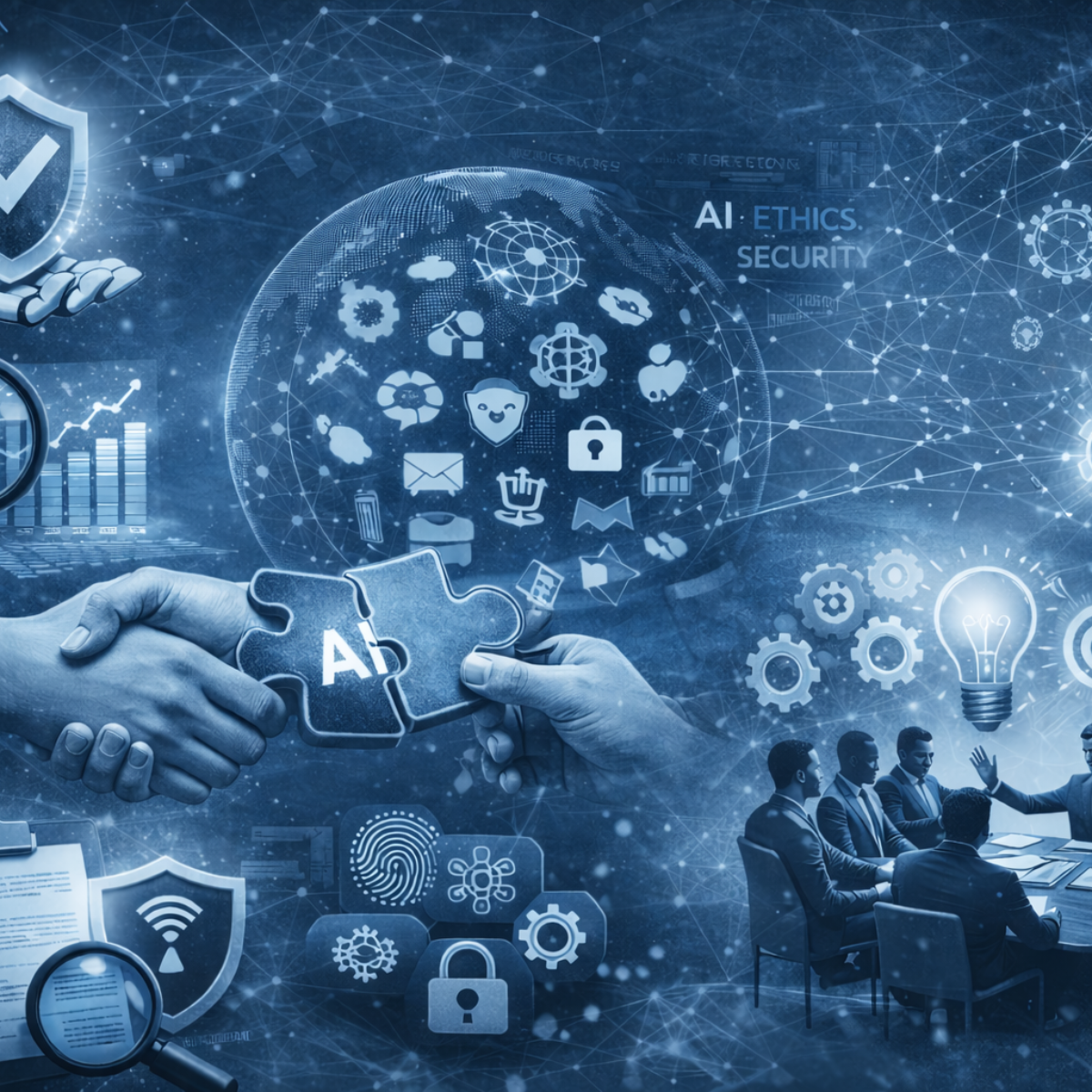
Executive Summary
Generative artificial intelligence (GenAI) technologies including large language models (LLMs) and tools such as ChatGPT represent a true paradigm shift with immense disruptive potential across all industries and business functions. While AI has existed for decades, recent advances have democratized access, dramatically improved performance, and spurred massive investment and adoption.
GenAI allows the creation of entirely new content like text, images, video, code, and data - not just regurgitating existing information. This automation power can streamline operations, accelerate development cycles, and drive productivity gains upwards of 50% for many worker tasks according to some early studies.
The economic impact is already visible, with 36% of S&P 500 companies discussing AI in 2023 earnings calls which led to large positive stock price movements; 71% of companies using AI are seeing returns of $3.50 on the dollar within 14 months. Sectors including finance, marketing, customer service, entertainment, drug discovery, and software are being shaken up and incumbent leaders are taking note.
However, risks around hallucinations, bias, security, and ethical governance must be proactively managed. But the productivity and competitive advantages are too compelling to ignore. Business leaders must develop a clear GenAI strategy, explore how it challenges existing models, and implement risk mitigation plans.
The GenAI revolution is underway - those who move swiftly to take advantage while governing responsible use will be well-positioned for the disruption ahead. Ignoring it is not an option for any business in the modern economy.
Introduction
In the fast evolving landscape of artificial intelligence (AI) development and adoption, I have frequently responded to questions from finance executives and CEOs struggling with how to introduce generative AI (GenAI) to their organizations. They feel that they must do something with the technology to stay competitive in the market; but what, when and how?
I will be publishing a series of (hopefully) short articles that address some of the most frequently asked questions over the coming weeks. The focus may at times zoom in on the organization’s finance function however the concepts are broadly applicable to other parts of the business and apply to any industry. I hope that you find the following content useful.
In this article I address the question: should business leaders be focused on AI and GenAI? Is it really that big of a deal? In one word: yes! Yes it is a big deal and many companies are leveraging it quite extensively in the functions of their business. But why? First, let us discuss what AI and GenAI are.
Bloomberg Intelligence forecast for GenAI revenue growth
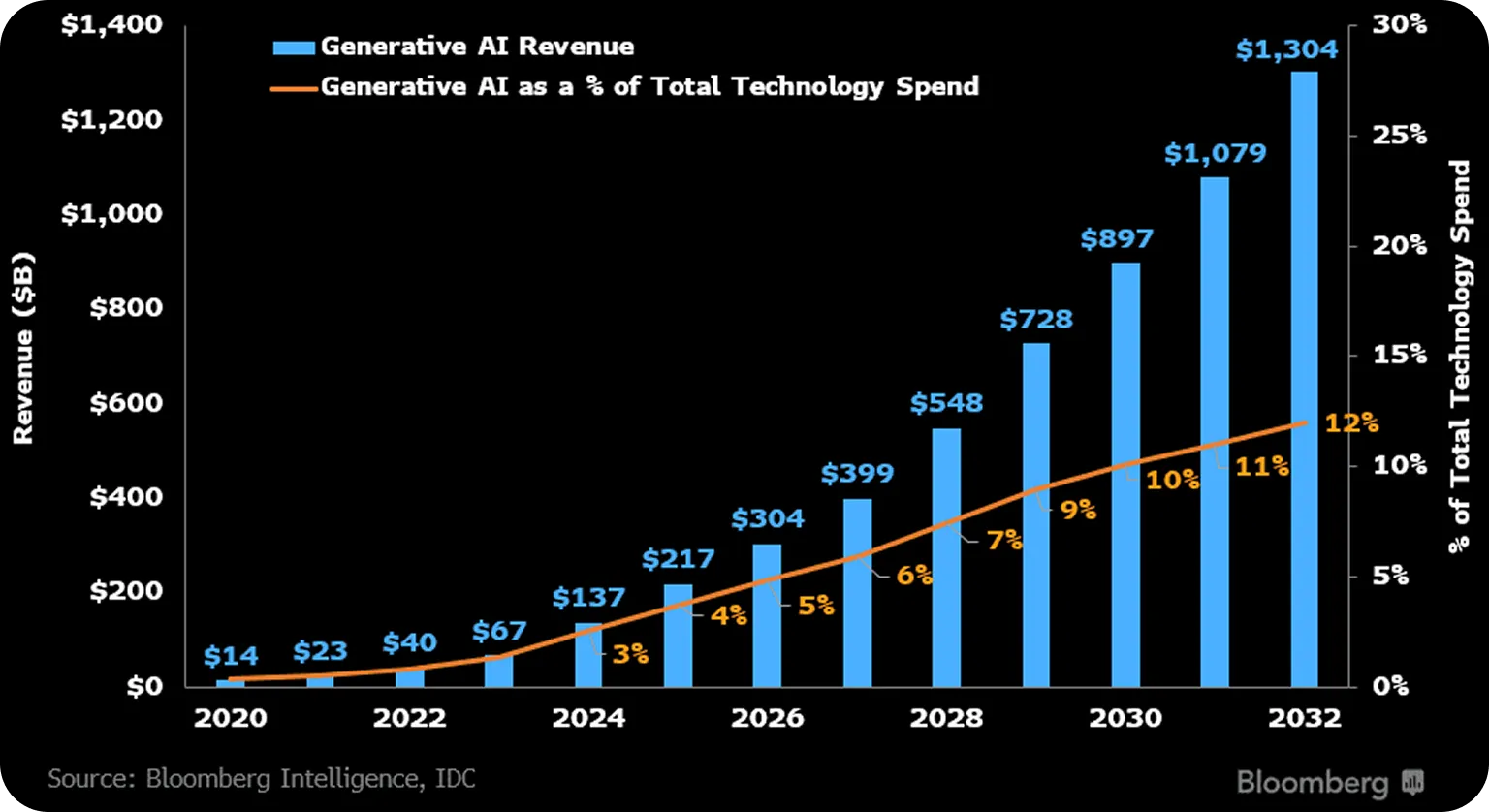
What is AI? What is GenAI?
AI is a broad term which defines systems and technologies that mimic human intelligence, vis-a-vis non-human or artificial. You may have encountered terms such as machine learning, robotics, natural language processing, expert systems or deep learning. These are all branches of AI and are indeed distinguishable from types of AI and types of learning in AI. Of the latter there are three expressed categories: artificial narrow intelligence (ANI), artificial general intelligence (AGI) and artificial super intelligence (ASI). Humanity's collective development of AI to date sits squarely within the first of these categories, and we are hurtling ever faster towards achieving the second. I will cover this in more detail in future articles. Precisely how far away we are from achieving AGI is a topic on which the AI community is divided; the implications of an AGI are uncertain, potentially paradigm shattering and perhaps dangerous. Think of the movie “The Terminator” in which the company Cyberdyne Systems developed the AGI Skynet and you begin to get a sense of the power of such a technology.
The history of AI dates back to the early 20th century with predominantly rules-based systems such as IBM's machine translation system (1954) and the basic natural language processing programs Eliza and PARRY (1960s). Increasingly more sophisticated uses of AI have been developed since then. Nowadays, you can barely pass a few hours without relying on an AI solution in some capacity; think of the maps you rely on in your mobile phones to get around, or the search engines which are your primary resource for your daily questions and you begin to get a sense of how pervasive AI is in our daily experiences. GenAI, popularized by the large language model (LLM) based chatGPT since November 2022, is truly a game-changer. On this the entire AI community agrees.
Readers versus Experts views on what counts as AI
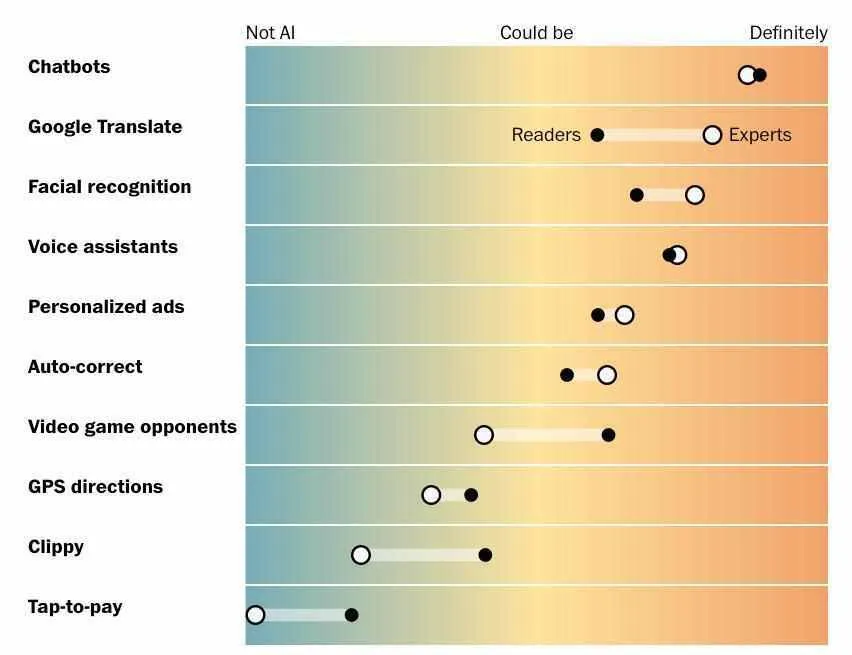
GenAI is a sub-field of machine learning AI which leverages the vast compute processing power available to us now to train complex models on huge amounts of data (think of billions and trillions of data points) thus creating a very powerful technology that is capable of creating entirely new content that isn't merely regurgitating the information that was fed into it. That content could be in the form of text, images, numbers, code, audio, video, even simulated data. Instead of searching the internet, we can chat with it; rather than write emails, our assistant in the cloud can do it for us. We can converse with code, conjure images, mold video clips and so on. This has the power to automate much of the work done in your business, or at the very least make it done faster, better and for cheaper.
ChatGPT user demographics
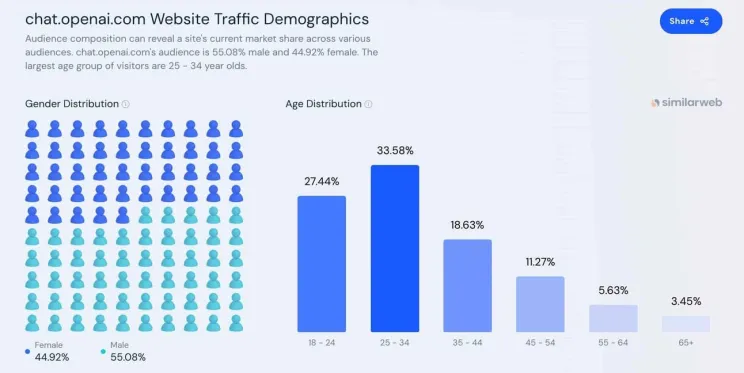
Machine learning AI has existed for quite some time, and can be traced back as far as the 1940s to the first mathematical model of neural networks by McCulloch and Pitts. What makes GenAI transformational compared to other earlier advances in AI are that:
- it democratized access to AI - no coding or programming knowledge is needed to build AI tools and there are low costs to use pre-built tools
- it dramatically improved model speed and performance
- it has commanded and prompted increased funding:
- AI startups have proliferated and venture capital funding in such went up over 425% in 2022 alone
- established full-stack technology providers have invested heavily in building powerful GenAI software
- technology vendors have invested in infusing AI across their solutions.
For these reasons, chatGPT marked a eureka moment in wider societal appreciation of AI's impact on all facets of our world, and that includes most functions of every organization.
Performance (MMLU) benchmark scores for some major AI models
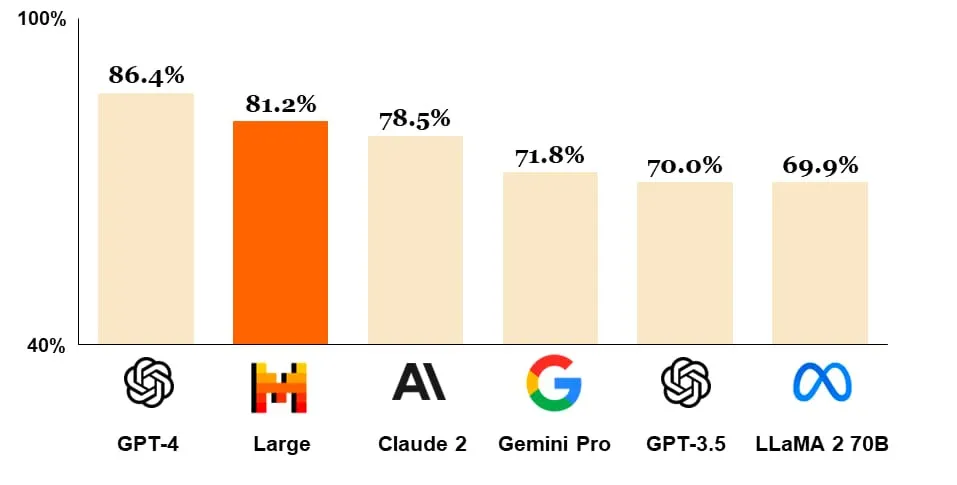
Pitfalls of AI Misuse
I do not intend to brush the issues and complexities surrounding applications of GenAI under the carpet. Much has been made of the incidents of hallucination, bias and error over the past year. There have been some high-profile cases of misuse as well. The lawyer representing a man in a personal injury lawsuit vs Avianca Airlines who cited six chatGPT fabricated cases springs to mind; as does the wellness chatbot Tessa that was set to replace humans on the US National Eating Disorder Association Helpline until it was found to be pushing aggressive diets.
Experts’ views on AI’s level of impact on personal lives
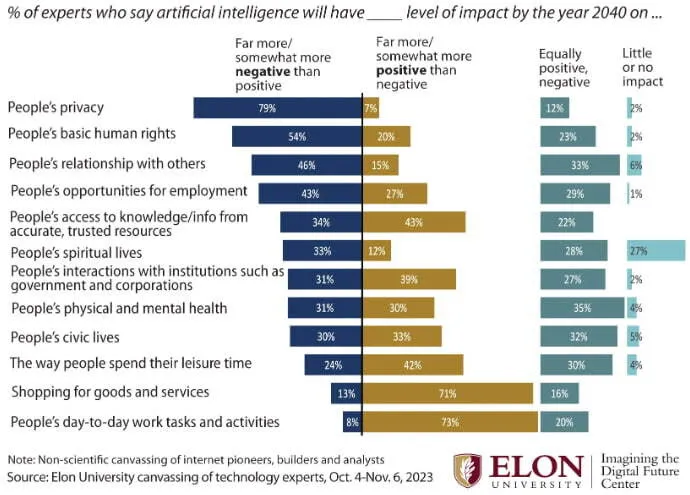
These are teething issues to be expected of a nascent technology, and most of these risks can be mitigated by expert use of the features in the engineering of your bespoke AI solutions. More recently, there has been a noticeable petering out of headline grabbing failures in AI use, indicative of the advances made in baseline models, improved engineering, institution of AI regulation and more informed use of the products. The more significant issues to address in the long term concern achieving transparency and explainability, safety, security and appropriate governance.
AI is a disruptor
It's important to note that not all forms of AI or GenAI are equally useful for your business. It's very cool that MidJourney's AI enables you to see what you'd have looked like as an explorer in the 13th century but that technology is hardly relevant towards improving your finance function or supply chain logistics for example. What is especially resonant about GenAI is that there are useful applications of its technologies for every type of business. The ultimate implication is that it will fundamentally affect our society and disrupt all industries, and we see many examples of this disruption already taking root.
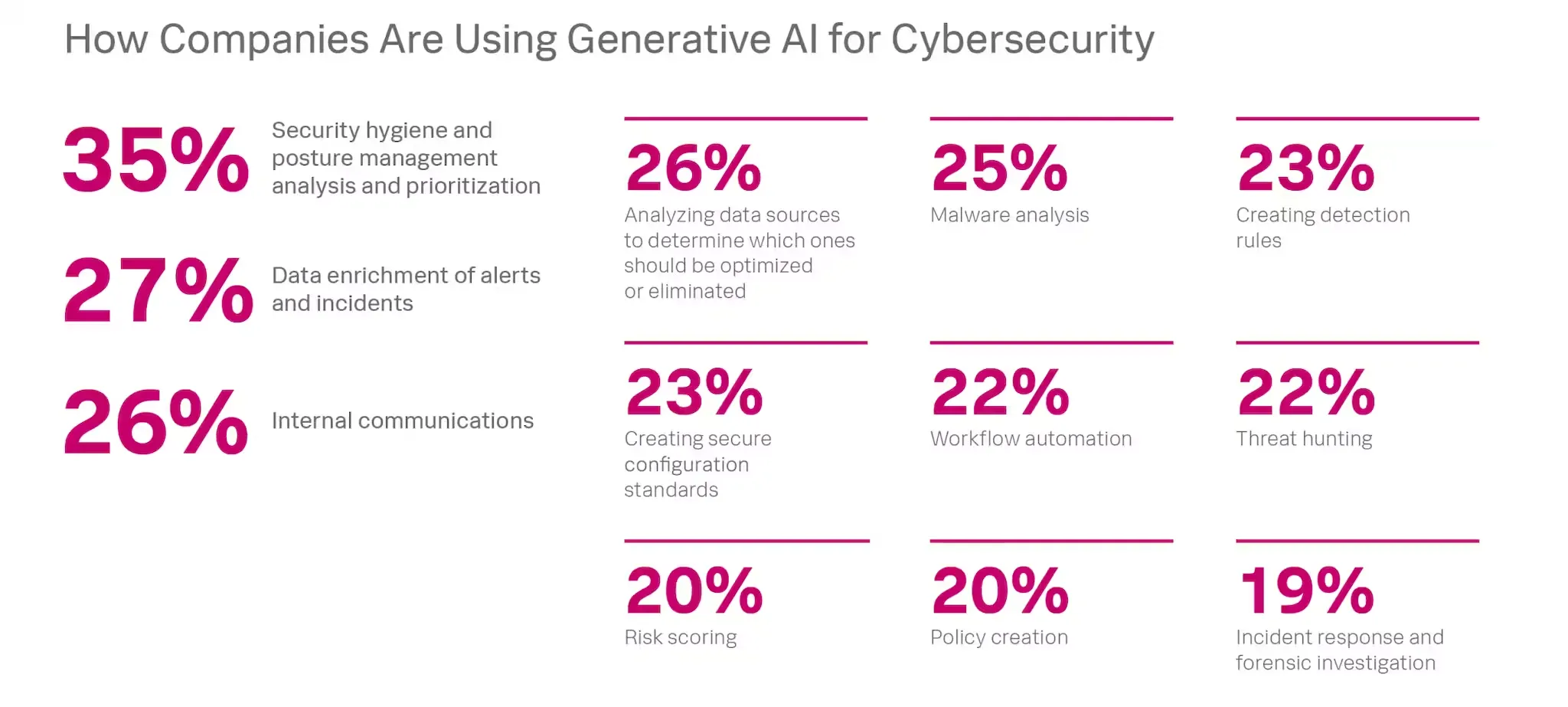
Did you know that GenAI has been a huge disruptor in the content creation driven entertainment industries? In February, Tyler Perry halted a $800m expansion plan for his Atlanta movie studios soon after seeing the capabilities of Sora, OpenAI's new text-to-video AI model, which compelled him to sound the alarm on the future of film-making in an interview to The Hollywood Reporter. And in response to the growing number of AI generated songs (see Ghostwriter977 for an amusing special case), artists are increasingly alarmed about how to protect their businesses. Grimes decided to team up with these AI creators by offering 50:50 royalties to anyone using her voice to make a song using GenAI. GenAI is impacting how brands connect with their target audiences, it is revolutionizing drug discovery and material science by creating novel new molecules with desired properties, it is streamlining the software development process by automating code generation and bug fixing, AI agents are improving customer service, and the list goes on.
How American businesses used AI in 2023
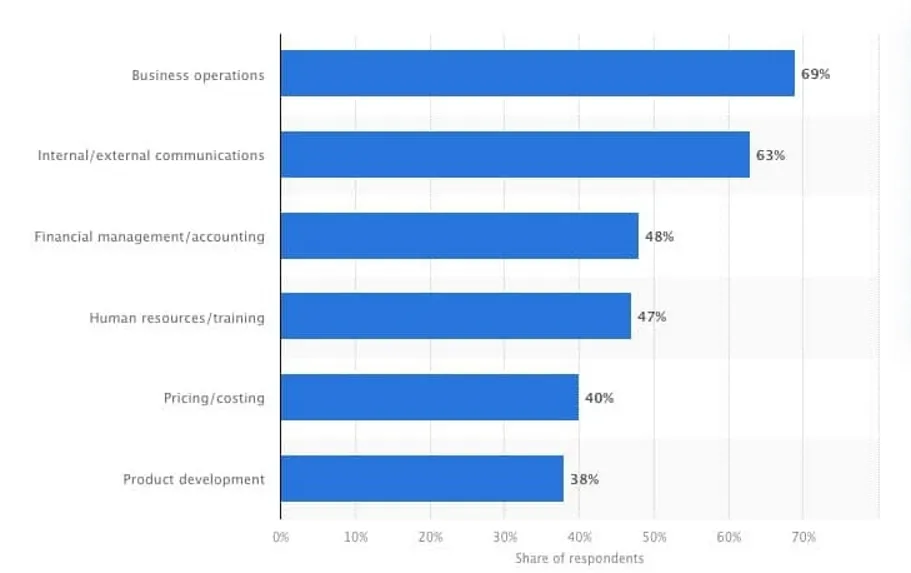
Conclusions
So sure there continues to be a lot of hype around GenAI right now and we may soon experience a transitory trough of disillusionment that often follows such peaks in expectations. Many of you who lived through the dot-com bubble can attest to this phenomenon, and that in the long term the worldwide web was here to stay. The same is true of AI and the large conglomerates know this. In 2023, 36% of S&P500 companies mentioned AI during their earnings calls, according to a report by Goldman Sachs, a record high. Technology companies were particularly enthusiastic, with 71% of them discussing AI during their earnings calls, resulting in an average stock price increase of 11.9%. Wall Street Zen reported an average increase of 4.6% for companies mentioning AI in their earnings calls compared to 2.4% for those that didn't, for the period between Quarter 1, 2022 and Quarter 2, 2023.
How Americans’ perspectives on AI have changed over the past year
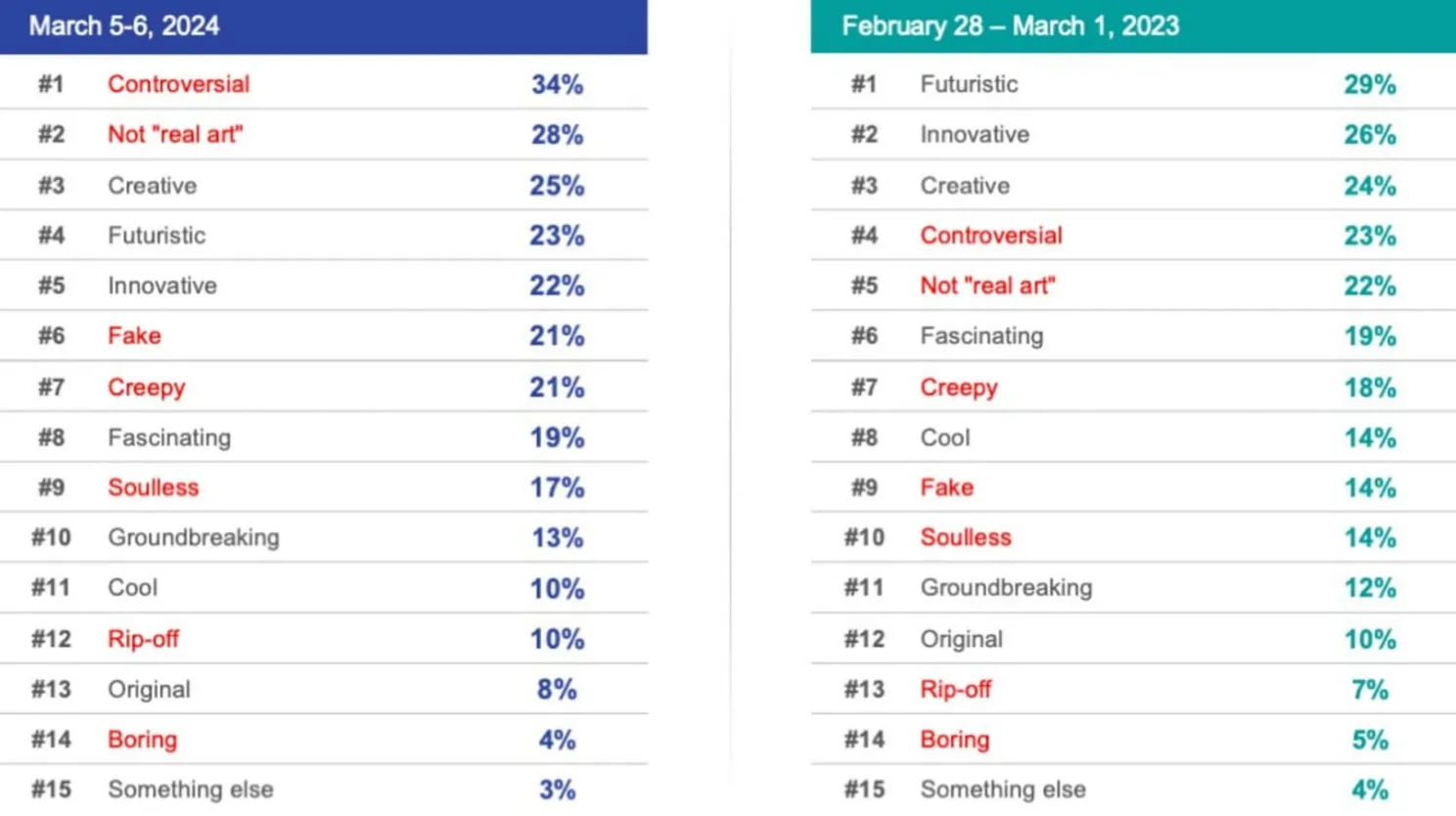
Early findings suggest significant productivity gains too which validate the conjecture around benefits. An August 2023 study conducted by OpenAI in conjunction with the University of Pennsylvania found that around 80% of the U.S. workforce could have at least 10% of their work tasks improved by the introduction of LLMs, while approximately 19% of workers may see at least 50% of their tasks impacted. About 15% of all worker tasks in the US could be completed significantly faster at the same level of quality. When incorporating software and tooling built on top of LLMs, this share increases to between 47 and 56% of all tasks. Nielsen Norman Group's research across three case studies covering customer service agents resolving customer inquiries in an enterprise software company, experienced business professionals writing routine business documents and programmers coding a small software project showed an average productivity improvement of 66% when using GenAI tools. The IDC’s report (November 2023), based on a survey of over 2,100 business leaders and decision makers with responsibility for AI transformation, found that 71% of companies already using AI are seeing returns on their AI investments within 14 months, averaging $3.50 for every $1 spent.
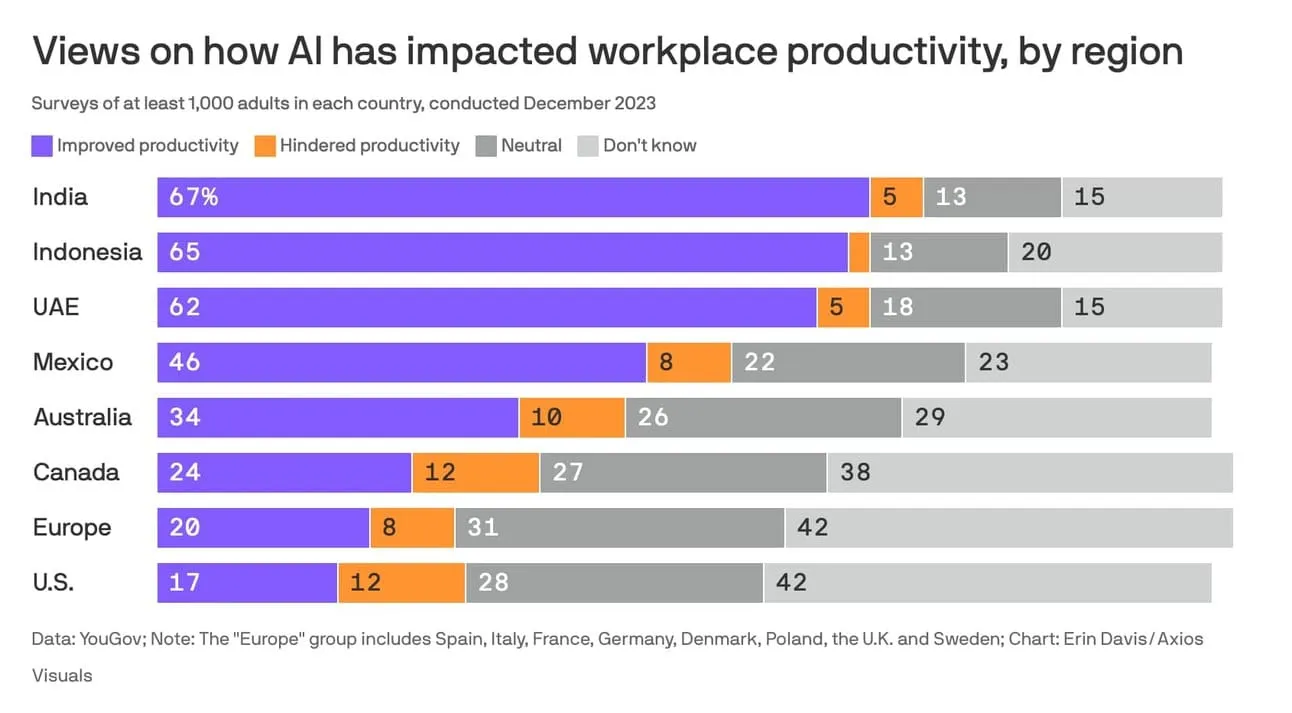
If you aren't already leveraging AI to enhance your business, my advice is to get a move on! Begin by asking yourself the following questions:
1. Do I have a GenAI strategy?
2. How will I use GenAI to challenge my existing business model?
3. Do I have a plan in place to mitigate risks?
------------------------------------------------------------------------
Subscribe to the AI newsletter and join the conversation on LinkedIn.
Have you begun to use AI yet? Or are you struggling to achieve tangible value from your deployments of AI to date?
Explore our offerings and acquire an expert partner today.

About The dAIta Solution
The dAIta Solution provides strategic consultancy, process and data mining, analytics, reporting and automation implementation solutions powered by AI that enable organizations to achieve their full potential hidden within the information that they possess. Our proprietary mining and analytics techniques and vendor-agnostic AI and data software streamlines the path to results and facilitates automation of both the analysis of your organization and implementing solutions to weaknesses or growth opportunities identified. Founded by senior consultancy services executives, data scientists and former EY leaders, The dAIta Solution is headquartered in Los Angeles with operations in London, Lagos and Singapore. For more information, please visit thedaitasolution.com.
Latest Resources
Want to see The dAIta Solution in action?
Get in touch now for a free demo of the platform, our products and services



